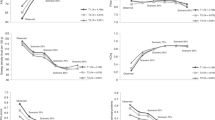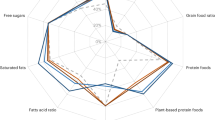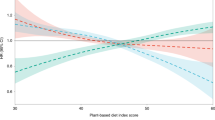Abstract
Knowledge in the role of plant-based diets on health had been shaped in part by cohort studies on vegetarians. We revisited publications from two ongoing longitudinal studies comprising large proportions of vegetarians—the Adventist Health Study-2 (AHS-2) and the European Prospective Investigation into Cancer and Nutrition-Oxford (EPIC-Oxford)—to describe the food and nutrient intake, health effects, and environmental sustainability outcomes of the dietary patterns identified in these studies. The vegetarian diet groups in both cohorts have essentially no meat intake, lower intake of fish and coffee, and higher intakes of vegetables and fruits compared to their non-vegetarian counterparts. In the AHS-2 cohort, vegetarians have higher intake of whole grains, legumes, nuts, and seeds. Vegans in AHS-2 have 16% reduced risk while vegans, vegetarians, and fish-eaters in EPIC-Oxford have 11–19% lower risk for all cancers compared to non-vegetarians. Pesco-vegetarians in the AHS-2 cohort had significantly lower mortality risk from all causes and ischemic heart disease while EPIC-Oxford fish-eaters had significantly lower all-cancers mortality risk than their non-vegetarians counterparts. Morbidity risks and prevalence rates for other chronic diseases were differentially reported in the two cohorts but vegetarians have lower risk than non-vegetarians. Greenhouse gas emissions of equicaloric diets are 29% less in vegetarian diet in AHS-2 and 47–60% less for vegetarian/vegan diets in EPIC-Oxford than non-vegetarian/meat-eating diets. The beneficial health outcomes and reduced carbon footprints make the case for adoption of vegetarian diets to address global food supply and environmental sustainability.
This is a preview of subscription content, access via your institution
Access options
Subscribe to this journal
Receive 12 print issues and online access
$259.00 per year
only $21.58 per issue
Buy this article
- Purchase on Springer Link
- Instant access to full article PDF
Prices may be subject to local taxes which are calculated during checkout



Similar content being viewed by others
Change history
25 April 2019
Since publication of the original version of this article, the authors noticed that some values of Table 4 were arranged under incorrect columns. These values have now been arranged correctly in both the HTML and PDF versions of this article.
References
Ruby MB, Heine SJ, Kamble S, Cheng TK, Waddar M. Compassion and contamination. Cult Differ Veg Appetite. 2013;71:340–8.
Leitzmann C. Vegetarian nutrition: past, present, future. Am J Clin Nutr. 2014;100:496S–502S.
Vegetarian Resource Group. Poll information [Internet]. How many adults in the U.S. are vegetarian and vegan? How many adults eat vegetarian and vegan meals when eating out? 2017. http://www.vrg.org/nutshell/Polls/2016_adults_veg.htm. Accessed 12 April 2017.
Vegetarian Society of the United Kingdom. Veggie living fact sheets [Internet]. Statistics: number of UK vegetarians. 2012. https://www.vegsoc.org/sslpage.aspx?pid=753.
Melina V, Craig W, Levin S. Position of the academy of nutrition and dietetics: vegetarian diets. J Acad Nutr Diet. 2016;116:1970–80.
Beeson WL, Mills PK, Phillips RL, Andress M, Fraser GE. Chronic disease among seventh-day adventists, a low-risk group - rationale, methodology, and description of the population. Cancer. 1989;64:570–81.
Appleby PN, Thorogood M, Mann JI, Key TJ. The Oxford vegetarian study: an overview. Am J Clin Nutr. 1999;70(3 Suppl):525S–531S.
Davey GK, Spencer EA, Appleby PN, Allen NE, Knox KH, Key TJ. EPIC-Oxford: lifestyle characteristics and nutrient intakes in a cohort of 33,883 meat-eaters and 31,546 non meat-eaters in the UK. Public Health Nutr. 2003;6:259–68.
Butler TL, Fraser GE, Beeson WL, et al. Cohort profile: the Adventist Health Study-2 (AHS-2). Int J Epidemiol. 2008;37:260–5.
Jaceldo-Siegl K, Knutsen SF, Sabate J, et al. Validation of nutrient intake using an FFQ and repeated 24 h recalls in black and white subjects of the Adventist Health Study-2 (AHS-2). Public Health Nutr. 2010;13:812–9.
Appleby PN, Crowe FL, Bradbury KE, Travis RC, Key TJ. Mortality in vegetarians and comparable nonvegetarians in the United Kingdom. Am J Clin Nutr. 2016;103:218–30.
Schmidt JA, Crowe FL, Appleby PN, Key TJ, Travis RC. Serum uric acid concentrations in meat eaters, fish eaters, vegetarians and vegans: a cross-sectional analysis in the EPIC-Oxford cohort. PLoS ONE. 2013;8:e56339.
Orlich MJ, Jaceldo-Siegl K, Sabate J, Fan J, Singh PN, Fraser GE. Patterns of food consumption among vegetarians and non-vegetarians. Br J Nutr. 2014;112:1644–53.
Burkholder-Cooley N, Rajaram S, Haddad E, Fraser GE, Jaceldo-Siegl K. Comparison of polyphenol intakes according to distinct dietary patterns and food sources in the Adventist Health Study-2 cohort. Br J Nutr. 2016;115:2162–9.
Jaceldo-Siegl K, Lutjohann D, Sirirat R, Mashchak A, Fraser GE, Haddad E. Variations in dietary intake and plasma concentrations of plant sterols across plant-based diets among North American adults. Mol Nutr Food Res. 2017. https://doi.org/10.1002/mnfr.201600828
Klingberg S, Andersson H, Mulligan A, et al. Food sources of plant sterols in the EPIC Norfolk population. Eur J Clin Nutr. 2008;62:695–703.
Sobiecki JG, Appleby PN, Bradbury KE, Key TJ. High compliance with dietary recommendations in a cohort of meat eaters, fish eaters, vegetarians, and vegans: results from the European Prospective Investigation into Cancer and Nutrition-Oxford study. Nutr Res. 2016;36:464–77.
Schmidt JA, Rinaldi S, Scalbert A, et al. Plasma concentrations and intakes of amino acids in male meat-eaters, fish-eaters, vegetarians and vegans: a cross-sectional analysis in the EPIC-Oxford cohort. Eur J Clin Nutr. 2016;70:306–12.
Rizzo NS, Jaceldo-Siegl K, Sabate J, Fraser GE. Nutrient profiles of vegetarian and non-vegetarian dietary patterns. J Acad Nutr Diet. 2013;113:1610–9.
Key TJ, Appleby PN, Crowe FL, Bradbury KE, Schmidt JA, Travis RC. Cancer in British vegetarians: updated analyses of 4998 incident cancers in a cohort of 32,491 meat eaters, 8612 fish eaters, 18,298 vegetarians, and 2246 vegans. Am J Clin Nutr. 2014;100:378S–385S.
Orlich MJ, Singh PN, Sabate J, et al. Vegetarian dietary patterns and mortality in Adventist Health Study 2. JAMA Intern Med. 2013;173:1230–8.
Orlich MJ, Fraser GE. Vegetarian diets in the Adventist Health Study 2: a review of initial published findings. Am J Clin Nutr. 2014;100:353S–358S.
Tantamango-Bartley Y, Jaceldo-Siegl K, Fan J, Fraser G. Vegetarian diets and the incidence of cancer in a low-risk population. Cancer Epidemiol Biomark Prev. 2013;22:286–94.
Orlich MJ, Singh PN, Sabate J, Fan J, Sveen L, Bennett H, et al. Vegetarian dietary patterns and the risk of colorectal cancers. JAMA Intern Med. 2015;175:767–76.
Spencer EA, Appleby PN, Davey GK, Key TJ. Diet and body mass index in 38,000 EPIC-Oxford meat-eaters, fish-eaters, vegetarians and vegans. Int J Obes. 2003;27:728–34.
Appleby PN, Davey GK, Key TJ. Hypertension and blood pressure among meat eaters, fish eaters, vegetarians and vegans in EPIC-Oxford. Public Health Nutr. 2002;5:645–54.
Key TJ, Appleby PN, Spencer EA, Travis RC, Roddam AW, Allen NE. Mortality in British vegetarians: results from the European Prospective Investigation into Cancer and Nutrition (EPIC-Oxford). Am J Clin Nutr. 2009;89:1613S–1619S.
Pettersen BJ, Anousheh R, Fan J, Jaceldo-Siegl K, Fraser GE. Vegetarian diets and blood pressure among White subjects: results from the Adventist Health Study-2 (AHS-2). Public Health Nutr. 2012;15:1909–16.
Tonstad S, Butler T, Yan R, Fraser GE. Type of vegetarian diet, body weight, and prevalence of type 2 diabetes. Diabetes Care. 2009;32:791–6.
Tonstad S, Stewart K, Oda K, Batech M, Herring RP, Fraser GE. Vegetarian diets and incidence of diabetes in the Adventist Health Study-2. Nutr Metab Cardiovasc Dis. 2013;23:292–9.
Rizzo NS, Sabate J, Jaceldo-Siegl K, Fraser GE. Vegetarian dietary patterns are associated with a lower risk of metabolic syndrome: the Adventist Health Study 2. Diabetes Care. 2011;34:1225–7.
Crowe FL, Appleby PN, Allen NE, Key TJ. Diet and risk of diverticular disease in Oxford cohort of European Prospective Investigation into Cancer and Nutrition (EPIC): prospective study of British vegetarians and non-vegetarians. Br Med J. 2011;343:d4131.
Le LT, Sabate J. Beyond meatless, the health effects of vegan diets: findings from the Adventist cohorts. Nutrients. 2014;6:2131–47.
Sabate J, Wien M. Vegetarian diets and childhood obesity prevention. Am J Clin Nutr. 2010;91:1525S–1529S.
Appleby PN, Key TJ. The long-term health of vegetarians and vegans. P Nutr Soc. 2016;75:287–93.
Palli D. InterAct consortium. Association between dietary meat consumption and incident type 2 diabetes: the EPIC-InterAct study. Diabetologia. 2013;56:47–59.
Burlingame B, Dernini S. Sustainable diets and biodiversity: directions and solutions for policy, research and action. Proceedings of the International Scientific Symposium, Biodiversity and Sustainable Diets United Against Hunger. Rome, Italy: FAO Headquarters; 2010. p. 83.
Sabate J, Soret S. Sustainability of plant-based diets: back to the future. Am J Clin Nutr. 2014;100:476S–482S.
Sabate J, Sranacharoenpong K, Harwatt H, Wien M, Soret S. The environmental cost of protein food choices. Public Health Nutr. 2014;18:2067–73. https://doi.org/10.1017/S1368980014002377.
Marlow HJ, Harwatt H, Soret S, Sabate J. Comparing the water, energy, pesticide and fertilizer usage for the production of foods consumed by different dietary types in California. Public Health Nutr. 2015;18:2425–32.
Soret S, Mejia A, Batech M, Jaceldo-Siegl K, Harwatt H, Sabate J. Climate change mitigation and health effects of varied dietary patterns in real-life settings throughout North America. Am J Clin Nutr. 2014;100:490S–495S.
Scarborough P, Appleby PN, Mizdrak A, et al. Dietary greenhouse gas emissions of meat-eaters, fish-eaters, vegetarians and vegans in the UK. Clim Change. 2014;125:179–92.
Dietary Guidelines Advisory Committee. Scientific report of the 2015 dietary guidelines advisory committee, Vol 7. Washington, DC: US Departments of Agriculture and Health and Human Services; 2015. p. 202–4.
Nelson ME, Hamm MW, Hu FB, Abrams SA, Griffin TS. Alignment of healthy dietary patterns and environmental sustainability: a systematic review. Adv Nutr. 2016;7:1005–25.
Reynolds CJ, Buckley JD, Weinstein P, Boland J. Are the dietary guidelines for meat, fat, fruit and vegetable consumption appropriate for environmental sustainability? A review of the literature. Nutrients. 2014;6:2251–65.
US Census Bureau. International Data Base. Total midyear population for the world: 1950–2050. https://www.census.gov/population/international/data/idb/worldpoptotal.php. Accessed 11th April, 2018.
Bellavia A, Stilling F, Wolk A. High red meat intake and all-cause cardiovascular and cancer mortality: is the risk modified by fruit and vegetable intake? Am J Clin Nutr. 2016;104:1137–43.
American Institute for Cancer Research; World Cancer Research Fund. Food, nutrition, physical activity, and the prevention of cancer: a global perspective. Washington, D.C.: AICR; 2007.
Sinha R, Cross AJ, Graubard BI, Leitzmann MF, Schatzkin A. Meat intake and mortality: a prospective study of over half a million people. Arch Intern Med. 2009;169:562–71.
Acknowledgements
The authors would like to thank Dr. Karen Jaceldo-Siegl for critically reviewing this manuscript.
Author contributions
Both authors conceived the work and met the criteria for authorship stated in the Uniform Requirements Submitted to Biomedical Journals. GS-S drafted and JS critically reviewed the manuscript. Both revised and approved the final version of the manuscript.
Funding
This article is published as part of a supplement sponsored by the Mediterranean Diet Foundation and the Diputació de Barcelona.
Author information
Authors and Affiliations
Corresponding author
Ethics declarations
Conflict of interest
JS has received funding from Hass Avocado Board (Effects on Obesity and Metabolic Syndrome), University of Eastern Africa, Baraton (subK/Nestle), SL Technology, Inc., California Walnut Commission, and American Egg Board (diabetes). GS-S declares that she has no conflict of interest.
Rights and permissions
About this article
Cite this article
Segovia-Siapco, G., Sabaté, J. Health and sustainability outcomes of vegetarian dietary patterns: a revisit of the EPIC-Oxford and the Adventist Health Study-2 cohorts. Eur J Clin Nutr 72 (Suppl 1), 60–70 (2019). https://doi.org/10.1038/s41430-018-0310-z
Published:
Issue Date:
DOI: https://doi.org/10.1038/s41430-018-0310-z
This article is cited by
-
Vegans, vegetarians, fish-eaters and meat-eaters in the UK show discrepant environmental impacts
Nature Food (2023)
-
Health relevance of lowering postprandial glycaemia in the paediatric population through diet’: results from a multistakeholder workshop
European Journal of Nutrition (2023)
-
The association between adherence to a plant-based diet and cognitive ageing
European Journal of Nutrition (2023)
-
Plant-Based Diets and Cancer Risk: What is the Evidence?
Current Nutrition Reports (2022)
-
Oncolytic viruses for cancer immunotherapy
Journal of Hematology & Oncology (2020)



